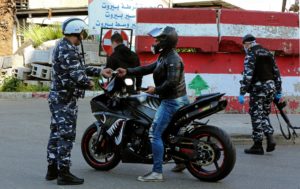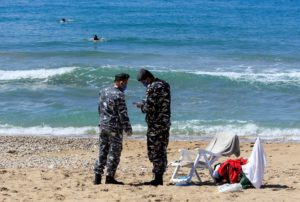-
Lebanon’s security forces deploy to enforce coronavirus lockdown

Lebanon’s military and security forces deployed across the country Sunday after the government announced a clampdown on those not complying with orders aimed at slowing the spread of the novel coronavirus.
Army helicopters toured the skies, calling on residents through loudspeakers not to venture out “in the interests of your own safety,” while soldiers set up roadblocks and carried out foot patrols on the streets.
The Internal Security Forces said its members had begun taking “stricter measures” to ensure the public was following government orders to stay in their homes except in cases of “extreme necessity.”
Those who fail to do so could be met with a fine and imprisonment of up to 3 years.
 A police officer fines a cyclist for violating lockdown in central Beirut, Lebanon, March 22. (AFP)
A police officer fines a cyclist for violating lockdown in central Beirut, Lebanon, March 22. (AFP)Moving beyond containment
The ramping up of military and security presence to curb the COVID-19 coronavirus came in response to failure to heed official orders to stay inside, Interior Minister Mohamad Fahmi said.
There were 248 confirmed cases of the COVID-19 coronavirus as of Sunday afternoon, according to the Health Ministry. Four people have died from the virus.
“The number of people infected with the virus has increased dramatically, and we have moved beyond the stage of containment,” Fahmi said in a televised speech, in which he detailed the measures first announced by Prime Minister Hassan Diab a day earlier.
“Any violation that poses a threat to public safety will be suppressed,” Fahmi added. All of the country’s security agencies will coordinate together with municipal authorities to ensure compliance with the rules.
People will be able to buy essential goods such as food and medicine, but will be prevented from gathering in groups or spending time outside without a good reason, the minister said.
Since the government’s announcement of a state of health emergency on March 15, normally bustling high streets and traffic-clogged highways have been emptied as people stay at home.
Numerous supermarkets have placed bottles of hand sanitizer at their entrances, and others have put up signs refusing entry to anyone not wearing gloves and a mask.
However, compliance with social distancing advice has not been universal.
Videos circulated on social media over the last week showed police ushering runners off Beirut’s seafront walkway, clearing a group of young boys packed into an online gaming center in the capital’s southern suburbs and breaking up a wedding party in east Lebanon’s Baalbek.
On Sunday morning, despite calls from the prime minister to self-curfew, 138 people were stopped by the ISF for flouting orders to stay at home.
https://twitter.com/CarmenJoukhadar/status/1239148730617606144
Nizar Saghieh, the co-founder of the Legal Agenda, told Al Arabiya English that clarity is needed from the government to help citizens understand what constitutes a violation of the order and how “extreme necessity” to leave their homes is defined.
“At the moment, it is up to each individual policeman to decide who is in violation, and we have to ensure that the law is not used to arrest just any citizen walking alone in the street,” he said.
Calls for the government to declare a nationwide state of emergency, which would grant more power to the country’s military, have increased in recent days, including from senior political figures.
This is not yet on the cards, according to the health minister, but said the government would take such action “if there is a failure to comply.”
A state of emergency can be declared only in response to major military or security crises or national disasters, Saghieh explained.
“At the moment we haven’t had such problems, so I don’t think there’s any use in declaring it,” he said.
“But if this epidemic develops into a security problem … a state of emergency could be possible.”
 Lebanese officials issue fines at the beach in Sidon amid the nation-wide lockdown, March 22. (Reuters)
Lebanese officials issue fines at the beach in Sidon amid the nation-wide lockdown, March 22. (Reuters)Lebanon has been gradually tightening measures to combat the coronavirus since the first case was confirmed on February 21, including school closures, shutting down restaurants and cafes and closing the airport, sea ports and land borders.
In addition to the additional security measures put in place Sunday, Lebanon’s General Security sterilized more than 72 Syrian refugee camps across the country and state-run TV channel TeleLiban Sunday broadcast the first in a series of “educational seminars” in an attempt to prevent children missing out on teaching. levant
source: Emily Lewis levant
You May Also Like
Popular Posts
Caricature
BENEFIT Sponsors BuildHer...
- April 23, 2025
BENEFIT, the Kingdom’s innovator and leading company in Fintech and electronic financial transactions service, has sponsored the BuildHer CityHack 2025 Hackathon, a two-day event spearheaded by the College of Engineering and Technology at the Royal University for Women (RUW).
Aimed at secondary school students, the event brought together a distinguished group of academic professionals and technology experts to mentor and inspire young participants.
More than 100 high school students from across the Kingdom of Bahrain took part in the hackathon, which featured an intensive programme of training workshops and hands-on sessions. These activities were tailored to enhance participants’ critical thinking, collaborative problem-solving, and team-building capabilities, while also encouraging the development of practical and sustainable solutions to contemporary challenges using modern technological tools.
BENEFIT’s Chief Executive Mr. Abdulwahed AlJanahi, commented: “Our support for this educational hackathon reflects our long-term strategic vision to nurture the talents of emerging national youth and empower the next generation of accomplished female leaders in technology. By fostering creativity and innovation, we aim to contribute meaningfully to Bahrain’s comprehensive development goals and align with the aspirations outlined in the Kingdom’s Vision 2030—an ambition in which BENEFIT plays a central role.”
Professor Riyadh Yousif Hamzah, President of the Royal University for Women, commented: “This initiative reflects our commitment to advancing women in STEM fields. We're cultivating a generation of creative, solution-driven female leaders who will drive national development. Our partnership with BENEFIT exemplifies the powerful synergy between academia and private sector in supporting educational innovation.”
Hanan Abdulla Hasan, Senior Manager, PR & Communication at BENEFIT, said: “We are honoured to collaborate with RUW in supporting this remarkable technology-focused event. It highlights our commitment to social responsibility, and our ongoing efforts to enhance the digital and innovation capabilities of young Bahraini women and foster their ability to harness technological tools in the service of a smarter, more sustainable future.”
For his part, Dr. Humam ElAgha, Acting Dean of the College of Engineering and Technology at the University, said: “BuildHer CityHack 2025 embodies our hands-on approach to education. By tackling real-world problems through creative thinking and sustainable solutions, we're preparing women to thrive in the knowledge economy – a cornerstone of the University's vision.”
opinion
Report
ads
Newsletter
Subscribe to our mailing list to get the new updates!






















